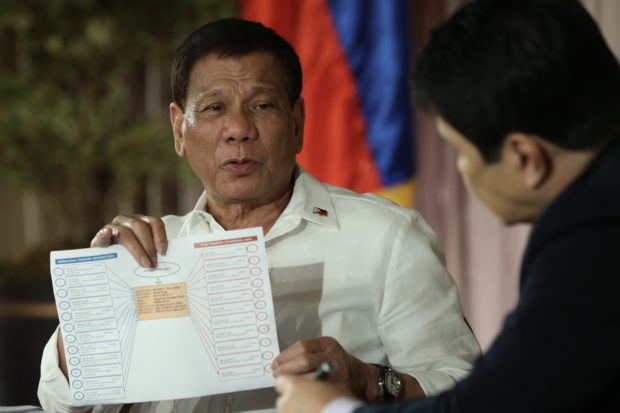
FOR REAL, THIS TIME? After admitting that he had invented the bank account number he attributed to Sen. Antonio Trillanes IV, President Duterte bares the matrix of what he described as the real offshore bank accounts of the senator. Mr. Duterte said Trillanes’ funds came from abroad and were being used to destabilize his administration. —MALACAÑANG PHOTO
While President Rodrigo Duterte’s threat to open a can of worms at the Office of the Ombudsman was seen as a reaction to the antigraft body’s probe of the President and his family’s finances, both his allies and detractors appeared to be at a loss about what Mr. Duterte really wanted to do.
They were, however, clear on one thing — the executive branch of government does not have the authority to investigate an independent, constitutional body like the Office of the Ombudsman.
Senate President Aquilino “Koko” Pimentel III said that authority rightly belonged to the legislative branch.
What Mr. Duterte was allowed to do under the Constitution, if he would make good his threat to expose alleged corruption at the Ombudsman, was to create a fact-finding body, Pimentel said.
The President said as much on Wednesday during a taped interview with government TV channel PTV 4 which was aired on Friday.
He said the body he would create to investigate the Ombudsman would be similar to the independent board of inquiry, Agrava Commission. The commission investigated the assassination of Marcos critic, Sen. Benigno Aquino Jr., which was suspected then of being instigated by the Marcos dictatorship.
Congress’ power
In a radio interview, Pimentel said results of the fact-finding body’s investigation could be forwarded to Congress for action. Congress has the sole power to remove top officials of constitutional bodies through impeachment.
Pimentel said people who have complaints against the Ombudsman could not go directly to Congress but may call the attention of the executive branch.
“But to discipline the Ombudsman, the executive cannot do that,” said Pimentel. “It should be the legislative branch in the impeachment process,” he said.
However, lawyer Dan Elijah Fajardo, president of the Integrated Bar of the Philippines, said creating an investigating body focused only on the Ombudsman would be “at best constitutionally suspect.”
He said an investigation of the Ombudsman initiated by the executive branch would “effectively defeat the independence and flexibility needed” by the graft investigating body.
What Mr. Duterte and other public officials should be reminded of, said Fajardo, was not to be “onion-skinned” because they were expected to live a life open to public scrutiny upon assuming office.
Pimentel agreed but said Mr. Duterte “is not like that at all.” “He’s used to local politics, which is more intense,” he said.
Vindictiveness
An opposition legislator, Rep. Edcel Lagman, said an executive-initiated investigation of the Ombudsman would be clearly an attempt to exert pressure.
Lagman said the Ombudsman’s independence would be “imperiled” by an investigation ordered by the President.
What Mr. Duterte’s rant against the Ombudsman simply showed is “vindictiveness and reprisal” against the Ombudsman’s probe of the Dutertes’ alleged unexplained wealth, Lagman said.
Instead of setting his sights on the Ombudsman, Mr. Duterte should form an independent commission to probe the “unabated” killings of drug suspects, Lagman said.
In a rant recorded by government TV station PTV 4, Mr. Duterte raged at the Ombudsman although without being categorical about the reason for his rage.
“If you do not investigate yourselves, I will set up a commission to investigate you, as a President with investigating powers,” Mr. Duterte said.
“There will be trouble between us, because who will investigate your shenanigans?” he said.
Presidential spokesperson Ernesto Abella followed up on Mr. Duterte’s tirades saying the Ombudsman was not immune to the menace of corruption and must be prepared to be investigated as well.
Abella said while the Ombudsman was expected to be the vanguard in the anticorruption campaign, it was “not exempt from allegations of corruption which, the President said, need to be investigated.”
No sacred cows?
The Ombudsman, Abella said, “should be open to any probe that would check into alleged corrupt practices among its officials and employees to underscore (the policy) that there are no sacred cows in the government.”
The Ombudsman had confirmed it was investigating the finances of the Duterte family, including the President, in response to a complaint filed by Sen. Antonio Trillanes IV, Mr. Duterte’s toughest critic, who had accused the President of hiding unexplained wealth.
In his PTV 4 interview, Mr. Duterte said the probe of Trillanes’ claims by the Ombudsman was based only on unsubstantiated reports.
The Ombudsman, said the President, relied only on media reports in its investigation. “How many cases have you investigated because of an (newspaper) article?” Mr. Duterte said in the PTV 4 interview.
“You investigated me before even without a signature. Why?” said the President, without explaining what he was referring to when he mentioned “signature.”
The President said while he could not initiate a prosecution of Ombudsman Conchita Carpio Morales because she was “immune,” there was nothing that could stop him from investigating her office’s other officials and employees.
Blasting critics who warned of a constitutional crisis if he pushed the Ombudsman to the wall, Mr. Duterte said: “Who will investigate the Ombudsman? If you are a judge, can you investigate yourself?”
“You say, ‘Well, we have this separate body to investigate the investigators.’ Don’t give me that shit,” Mr. Duterte said.
“In the name of public interest and in the name of justice and fair play, there ought to be a body who will investigate you also because the Ombudsman cannot investigate itself,” the President said.
Mr. Duterte said it was the Office of the Ombudsman that started the fight. —REPORTS FROM JOCELYN UY, DJ YAP AND LEILA SALAVERRIA